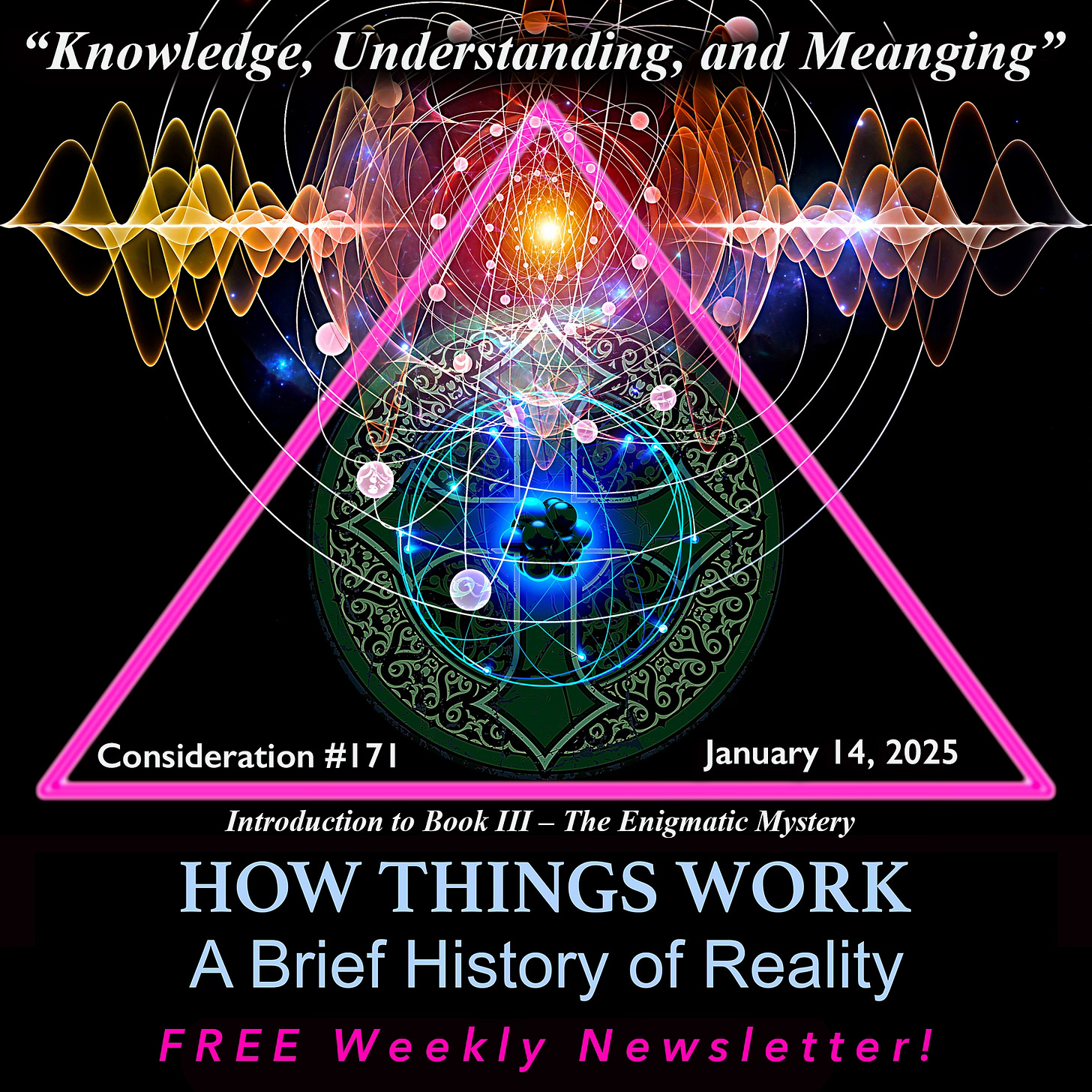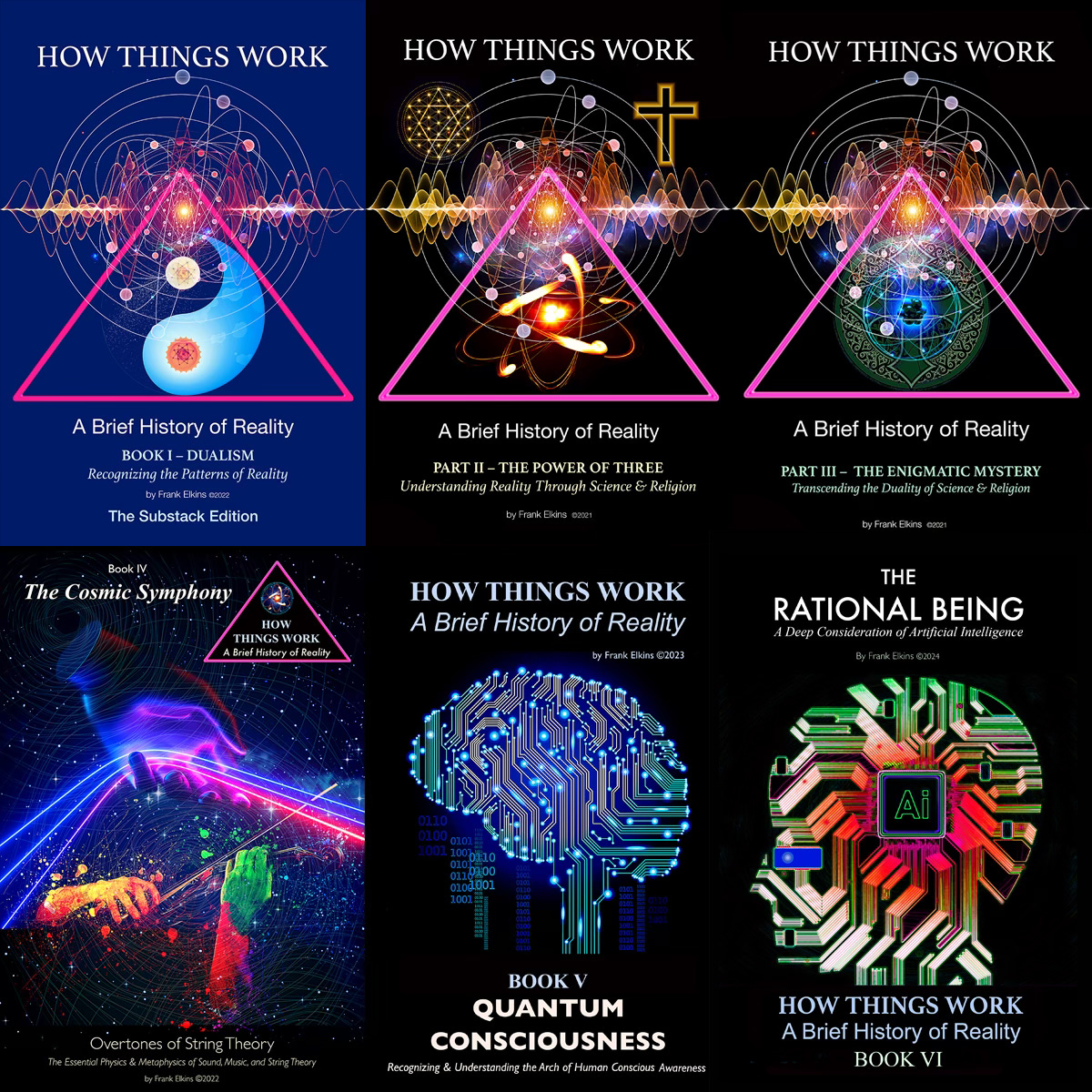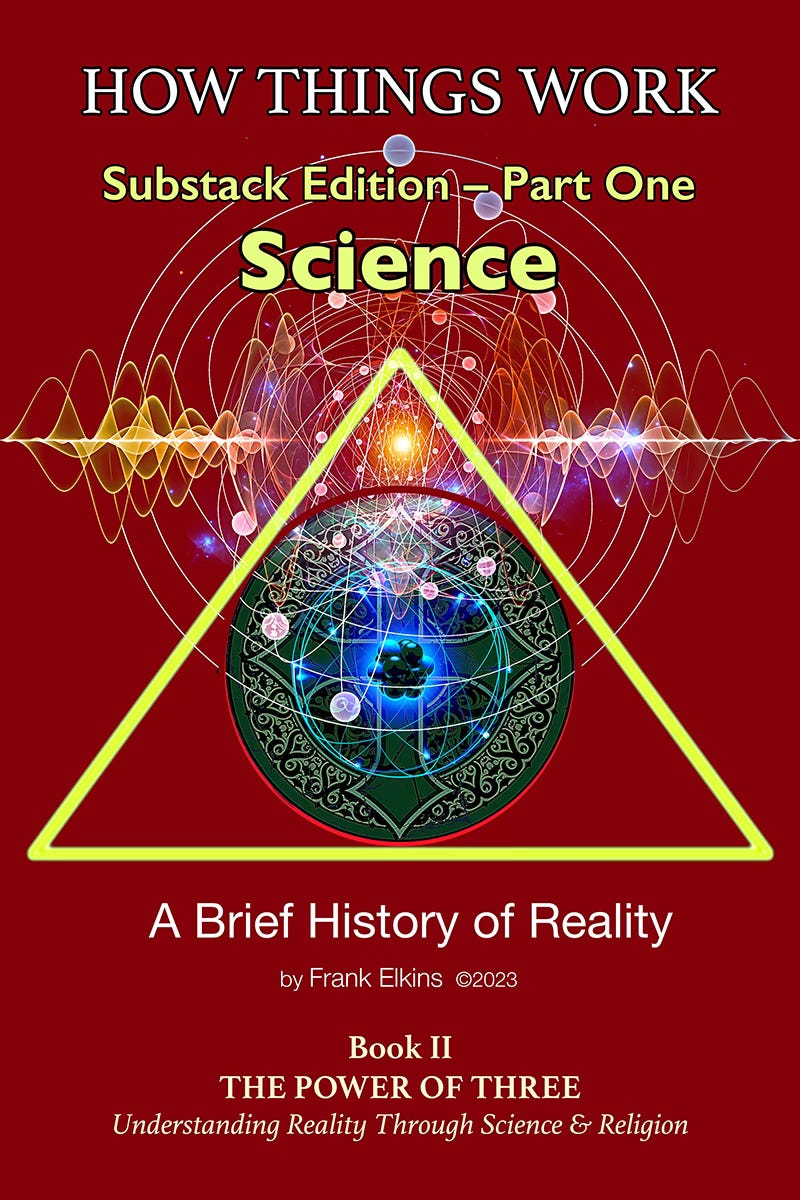Knowledge, Understanding, and Meaning
BOOK III: The Enigmatic Mystery (Science & Religion) – Consideration #171
Be a part of the Conversation!
Tuesday January 14, 2025
“Life is without meaning. You bring meaning to it. The meaning of life is whatever you ascribe it to be. Being alive is the meaning.”
– Joseph Campbell
PREFACE
Welcome Everybody!
This year we begin our consideration of Book III, The Enigmatic Mystery, which completes Volume One in the How Things Work, book series. Volume One is a consideration of Science & Religion.
Book I, Dualism, considers the influence regarding the metaphysical roots of Greek Philosophy on the development of Western culture and the schism between science and religion leading to the digital dualism we call computers. Book II, The Power of Three, considers the scientific and religious narrative and their connection to Hegel’s understanding of trinities and their power to transcend dualism, resulting in a rational Holy Trinity (Father, Son, Holy Spirit) and an empirical Atomic Trilogy (Proton, Neutron, Electron). Book III is a consideration that perhaps the rational mystery of religion and the empirical mystery of science are the same mystery.
“As human beings we recognize patterns in the world…”
The ultimate goal of both science and religion is to bring knowledge, understanding, and meaning into our lives. As human beings we recognize patterns in the world, then we attempt to understand what they mean and how they work. Religion has traditionally focused on the rational patterns of subjective reality to consider the spiritual nature of human beings including “mind.” Science has traditionally focused on the empirical patterns of physical reality to consider the objective universe. Eventually, they came to be seen as two distinct considerations regarding uniquely distinct and separate realities, or truths.
“What is this unsolvable Enigmatic Mystery?”
However, with the advent of more rational scientific theories such as quantum mechanics, string theory, and the holographic principle, the idea of obtaining certainty in either rational or empirical reality is becoming suspect. What is this unsolvable Enigmatic Mystery? Why is reality ultimately a spiritual and scientific paradox?
CONSIDERATION #171 – Knowledge, Understanding, and Meaning
Introduction to Book III – The Enigmatic Mystery
Human beings have often been described as “meaning making machines” by psychologists and others who study human behavior. We recognize patterns and want to understand how they occur. We come to understand those patterns and want to know how we can use them to make predictions about the world. We combine thought with those predictions to produce complete systems of understanding based on logic and reason. This obsession with gaining more knowledge, more understanding, and more meaning in our lives has led to the creation of science and technology far beyond the imagination of our ancestors.
“Recognition is connected to the question ‘what?’”
The first step in gaining meaning is recognition. Recognition is connected to the question “what?”. What is this? What are its characteristics? What makes it different, or unique, from other things? Duality represents this first step.
Human beings are capable of recognizing patterns of existence that become the foundation for inquiry and investigation. What are these patterns? What patterns are consistent and what patterns are not? Are there connections between these patterns? What are these connections? Is there a pattern between these connections? Recognition is the foundation of knowledge. Duality makes recognition, or distinction, possible. Seeking to gain more knowledge leads to the next question, “how?”
Once something is recognized as a pattern, we want to know how that pattern works. What is the mechanism causing these patterns and how does it work? Once we recognize something of unique interest, we want to understand it. We want to know more about it. However, this kind of knowledge requires a new perspective that allows for an expansion of inquiry involving reason, or what we sometimes call thinking.
“Understanding how patterns work is the essential purpose of science.”
As we begin to think and reason about the patterns of existence it brings us a greater understanding of how the process of existence works. We can even change, or become part of that process, if we want to. Understanding how patterns work is the essential purpose of science. How does gravity work? How do atoms combine to form matter? How can light have the qualities of both waves and particles? How did the universe begin? These questions lead to the ultimate question related to meaning, “why?”
Once something is recognized and understood, we naturally move to the existential question of why it is the way it is. Why do things exist and why do events occur? Why was the universe created? Why was I created? Is there a reason for all of this? These are the questions of purpose posed by theology and religion. They are questions related to meaning.
“God reflects the experience of our relationship with the universe.”
Meaning infers relationship. Traditionally, God has been considered the First Cause in this relationship. Ultimately, God reflects the experience of our relationship with the universe. This divine recognition of meaning transcends our understanding of the universe into a mystical experience of becoming one with the universe. Meaning is not an answer to a question, it is an experience that transcends the question. Meaning surpasses knowledge; meaning is existential.
From one, two. From two, three. From three, one again.
From duality and trinity to unity.
From God to God…
POSTSCRIPT
Like Taoism and Buddhism, Science decided to omit the divisive unverifiable concept of God from its lexicon. However, one of its main goals was to find out “how it all began.” This led to questions regarding how the universe started. The essential scientific argument proposes that the universe started with the Big Bang. However, the problem becomes what existed “before” the Big Bang and what caused the Big Bang in the first place? These questions continue to remain a scientific mystery. More importantly, they appear to be a scientific mystery that is inherently unsolvable.
According to science, prior to the Big Bang what we think of as reality did not exist; there were no laws of physics. No time, no space, no physical objects of any kind. How does science consider and make sense out of a reality without the laws of physics? Is it even possible? Could such an investigation really be considered science? To a great extent, this is the situation quantum science is now facing. Quantum science is a paradox.
“Who encoded and turned on the projector for the holographic universe?”
Is it even possible for science to discover the nature of reality prior the Big Bang? What caused the Big Bang? What caused the “strings of reality” to start vibrating in the first place? Who encoded and turned on the projector for the holographic universe? How did consciousness and life develop? These scientific questions are reminiscent of many religious questions such as, what was the first cause of everything? How can God live outside the laws of physics? Why did God create the universe? How is God connected to everything?
Perhaps Science and Religion are beginning to ask similar questions because they are both ultimately considering the same mystery.
Next week we begin our consideration of the traditional scientific explanation of reality with the Big Bang, which is not as big as you might think…
Get More Reality! With the “Reality by a Thread” Paid Upgrade…
Click Image to Learn More…
Unique Content Makes Untangling the Knots of Reality “One of the Best Podcasts about History!”
“…this unique Substack podcast by FRANK ELKINS is not strictly speaking history. It is a strange mix of history, philosophy, theology, spirituality, physics, and astronomy… today scientists like to divide our world into subjects, and these subjects into niches. Yet, the world we live in is just one, and we strive to comprehend it as it is. Try this podcast for a start.”
– Barbora Jirincova, The Best Podcasts About History
Excerpt from this week’s podcast: “Untangling the Messiah”
Excerpt From This Week’s “Reality by a Thread”
“It is not that Western human beings considered the nature of empirical reality and Eastern human beings did not, it is that Western and Eastern philosophies regarding the essential nature of the empirical world and the role of human beings in it are inherently different. However, it is this essential difference that leads to the development of Western science.”
– Frank Elkins (Reality by a Thread: January 16 , 2025)
All for less than a couple of cafe lattes every month at a local coffee shop! And You Will Have Something Interesting to Talk About With Your Friends at the Coffee Shop!!
Only $7.00 a month or $70.00 a year! UPGRADE NOW!
Subscribed
Books I-VI Are Available NOW! Click Image for more information…
The Substack Edition of SCIENCE is also now available! Click Image for more information…





